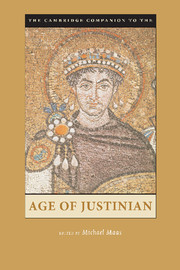15 - Literary Culture under Justinian
from Part 3 - Literature and the Arts
Published online by Cambridge University Press: 28 May 2006
Summary
Justinian’s reign is distinguished by its lasting accomplishments in law and architecture. It is also unusually rich in written sources, a treasure trove of documentation that provides insight and detailed knowledge about the sixth century that is rarely matched for other periods in the ancient world or Byzantium. There is no consensus, however, in the evaluation by posterity of the literary activities under Justinian and the emperor’s role in fostering them. Scholars of an earlier generation, such as J. B. Bury and Glanville Downey, tend to credit “the favorable atmosphere of the capital” for producing “the glories of Justinian’s age” in literature. But critical voices were already heard in Byzantium. The twelfth-century chronicler John Zonaras remarks that “by making the teachers redundant,” Justinian was responsible for a new level of “boorishness” (agroikia). This refers to Justinian’s order in 529 to stop the teaching of philosophy and law in Athens - a measure that effectively shut down the Academy, a bastion of learning in the classical tradition that had been founded by Plato in the fourth century BCE where church fathers like Basil of Caesarea and Gregory of Nazianzus had completed their education. This order was part of Justinian’s effort to suppress any teaching by those “who are infected with the sacrilegious foolishness of the Hellenes [i.e. pagans[” in order to enforce Christian uniformity and imperial control on the institutions of higher learning in the empire.
- Type
- Chapter
- Information
- The Cambridge Companion to the Age of Justinian , pp. 376 - 398Publisher: Cambridge University PressPrint publication year: 2005
- 7
- Cited by

